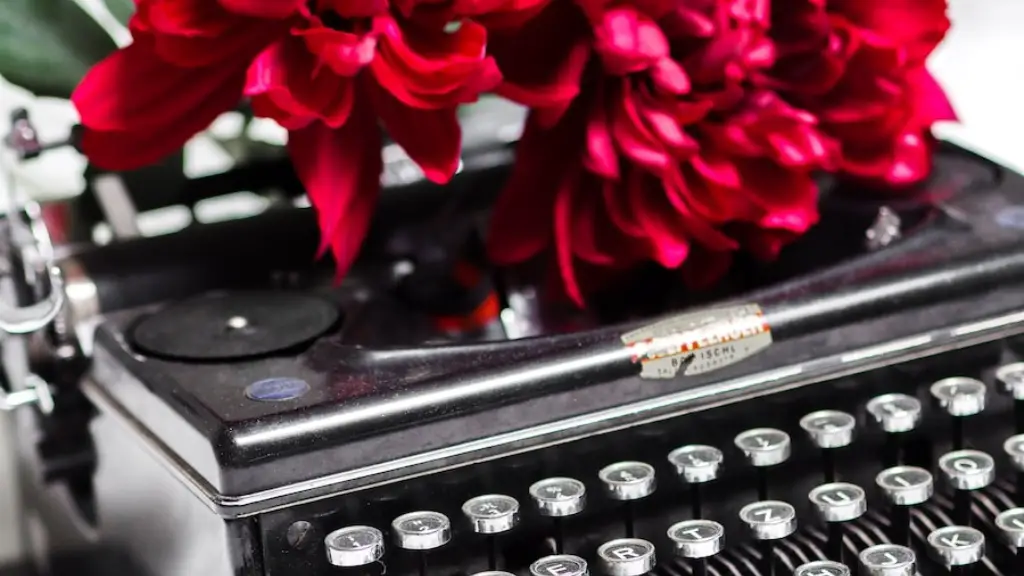A hyperbole is a figure of speech that is used for dramatic or rhetorical effect. It is a deliberate exaggeration of a statement or situation for effect, and is often used to emphasize a particular point or to make a point more vividly.
Hyperboles are commonly found in poetry, as the exaggeration and intensity of the language is often necessary to explore a deeper emotional resonance with the reader. In poetry, hyperbole can be seen as a way of heightening emotions and creating a vivid image or scene, allowing the poet to express a feeling that cannot be communicated through literal phrasing.
To give an example of hyperbole in poetry, a poem might describe a “river of tears” flowing down the speaker’s cheeks—this is obviously an exaggeration and can suggest a deep emotional intensity that is difficult to convey without the use of hyperbole.
While hyperboles can be used to signify exaggerations, they can also be used to signify unexpected situations. For example, a poet may use hyperboles to describe someone’s surprise or shock at an event, such as describing a moment in which “time stood still.” This is meant to indicate that the shock of the moment was so powerful that the feeling seemed to last an eternity, and thus the poetic hyperbole.
Hyperboles are also used in everyday conversation, appearing most often in the form of colloquialisms that evoke an image or emotion. For example, someone might say that they have a “million things to do” or that they are “dying of embarrassment.” These expressions are used to communicate a feeling or idea that is greater than the literal meaning, and they are an example of the use of hyperbole in everyday language.
The use of hyperboles in poetry is an important tool for conveying intense emotions, and as such they should be used carefully. While they can create powerful imagery and express intense emotions, they should also be used in moderation—too many hyperboles can feel overdone and can take away from the power of the poem.
History of Hyperbole
Hyperboles have been used for thousands of years, appearing in Ancient Greek plays, poems, and even the Bible. In Ancient Greece, for example, the use of hyperbole was seen as a way to draw attention to a particular idea or emotion and to create an intense atmosphere. This technique was later used in Medieval literature as well, with the use of hyperbole providing a way to subvert traditional conventions and to convey ideas that would have been considered distasteful or blasphemous at the time.
In more modern times, the use of hyperbole has become increasingly widespread, resulting in it becoming a common form of speech. This has allowed hyperbole to become a great deal more flexible, as it is now used to express a wide range of emotions and ideas. As a result, the use of hyperbole in poetry has become increasingly varied, allowing poets to explore a nuanced range of emotions within their works.
Criticism of Hyperbole
While hyperboles can be a powerful tool for conveying emotion, they can also be criticized for their overuse and for what is considered to be an artificial or contrived manipulation of language. This is especially true in poetry, as some critics argue that the use of hyperbole can remove the authenticity of the poem and make it appear overly sentimental or false.
In addition, hyperboles can be seen as too predictable and as a result, lack the impact of more subtle forms of expression. This is especially true in contemporary poetry, as readers have become more familiar with the use of hyperbole and so, it has become an expectation rather than an exception when it comes to poetic expression.
Modern Usage
Despite the criticism, hyperbole remains an important part of poetry and is one of the most commonly used techniques by contemporary poets. Despite the criticism of it being overused and artificial, hyperbole can still provide intense emotional resonance and can be used to create vivid scenes and evoke powerful imagery.
The use of hyperbole in poetry has changed significantly over the years, but it has remained an important tool for poets to explore intense emotions and create powerful images. As the use of hyperbole has become increasingly accepted in contemporary poetry, it can be seen as a tool for poets to explore unconventional emotions and to make bold statements.
Impact on Language
The use of hyperbole has had a profound impact on the spoken language and has become increasingly commonplace in everyday speech. The use of hyperbole in everyday life is often seen as a sign of an over emotive person or a person who is overly dramatic, but the truth is that hyperboles are simply a way to communicate intense ideas and emotions without having to resort to literal language.
When used correctly and judiciously, hyperbole can be a powerful tool for communication. By conveying extreme emotions and ideas, it allows us to communicate ideas that we may not be able to with literal language. As such, it is an important tool for poets to express their deepest emotions, but it should be used with care and in moderation.
Conclusion
Hyperbole is an important tool for poets to convey intense emotions and to create vivid scenes and images. While hyperbole can be criticized for its overuse, it remains a powerful and effective tool for creating emotionally resonant poetry. As such, it should be used judiciously and in moderation.



